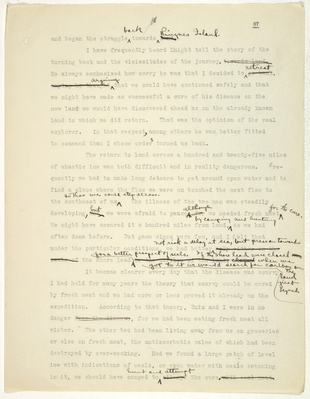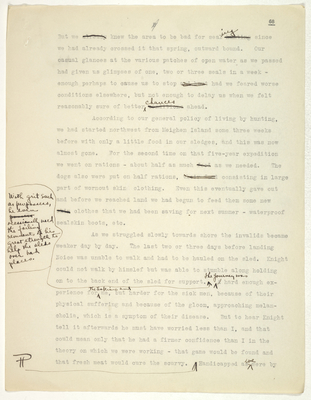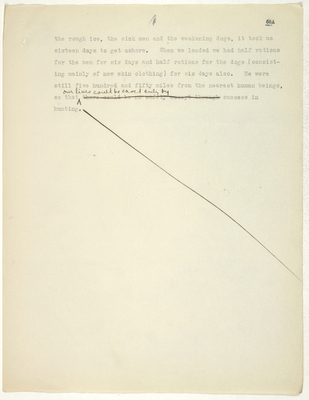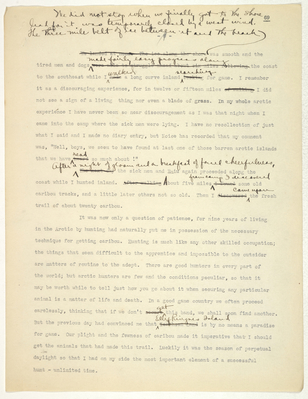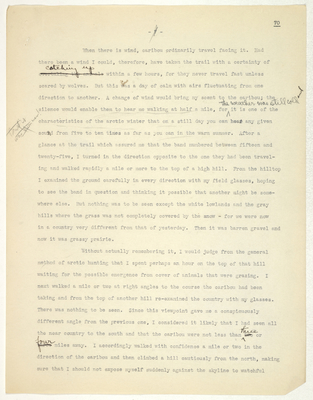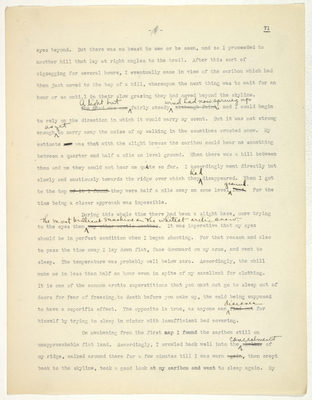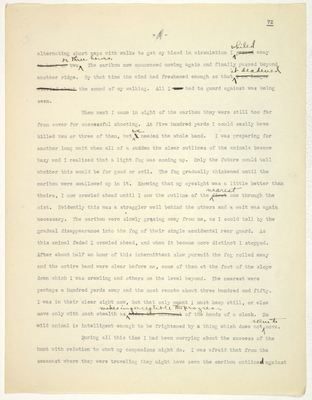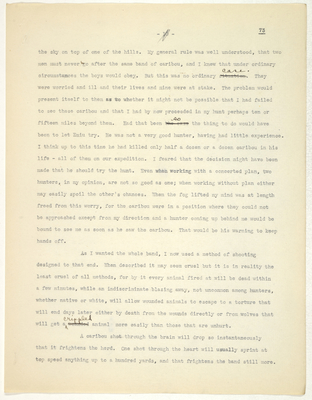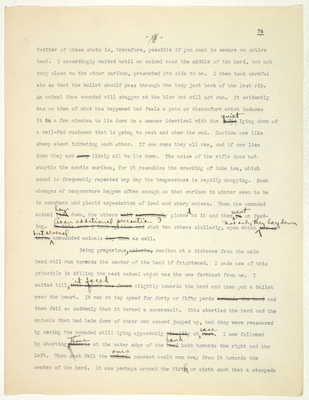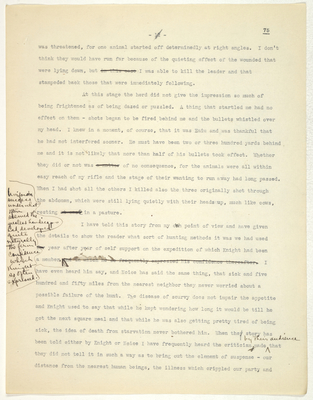Pages That Need Review
stefansson-wrangel-09-27
stefansson-wrangel-09-27-024
67
and began the struggle back towards land Ringnes Island.
I have frequently heard Knight tell the story of the turning bach and the vicissitudes of the journey. towards land He always emphasized how sorry he was that I decided to retreat go back, saying he thought arguing that we could have continued safely and that we might have made as successful a cure of his disease on the new land we would have discovered ahead as on the already known land to which we did return. That was the optimism of the real explorer. In that respect, among others he was better fitted to command than I whose orders turned us back.
The return to land across a hundred and twenty-five miles of chaotic ice was both difficult and in reality dangerous. Frequently we had to make long detours to get around open water and to find a place where the floe we were on touched the next floe to the southeast of us so that we could step across. The illness of the two men was steadily developing, but and we were afraid to pause although for we needed fresh meat for the cure. We might have secured it a hundred miles from land, by camping and hunting as we had often done before. But game signs were few, and I felt that under the particular conditions, we had better not risk a delay at sea, but press on towards rely either on the scale of the shore land for a better prospect of seals. Or the Caribeu of the land. If the shore lead were closed when we got to it we would search for carabou on the land first beyond.
It became clearer every day that the disease was scurvy. I had held for many years the theory that scurvy could be cured by fresh meat and we had more or less proved it already on the expedition. According to that theory, Emiu and I were in no danger, from the disease we had been eating fresh meat all winter. The other two had been living away from us on groceries or else on fresh meat, the antiscorbutic value of which had been destroyed by over-cooking. Had we found a large patch of level ice with indications of seals, or open water with seals swimming in it, we should have camped to hunt and attemptattempt the cure. with seal meat.
stefansson-wrangel-09-27-025
68
But we already knew the area to be had for sealing hunting since we had already crossed it that spring, outward hound. Our casual glances at the various patches of open water as we passed had given us glimpses of one, two or three seals in a week - enough perhaps to cause us to stop and hunt had we feared worse conditions elsewhere, hut not enough to delay us when we felt reasonably sure of better chances conditions ahead.
According to our general policy of living by hunting, we had started northwest from Meighen Island some three weeks before with only a little food in our sledges, and this was now almost gone. For the second time on that five-year expedition we went on rations - about half as much food as we needed. The dogs also were put on half rations, their food consisting in large part of wornout skin clothing. Even this eventually gave out and before we reached land we had begun to feed them some new skin clothes that we had been saving for next summer - waterproof sealskin boots, etc.
As we struggled slowly towards shore the invalids became weaker day hy day. The last two or three days before landing Noice was unable to walk and had to he hauled on the sled. Knight could not walk by himslef hut was able to stumble along holding on to the back end of the sled for support. With grit such as few [possers], he even possers occasionally used the failing remnants of his great strength to help the sleds over bad places.The journey was hard enough experience for the Eskimos and me, but harder for the sick men, because of their physical suffering and because of the gloom, approaching melancholia, which is a symptom of their disease. But to hear Knight tell it afterwards he must have worried less than I, and that could mean only that he had a firmer confidence than I in the theory on which we were working - that game would be found and that fresh meat would cure the scurvy. Handicapped as we were by
stefansson-wrangel-09-27-026
68A
the rough ice, the sick men and the weakening doga, it took us sixteen days to get ashore. when we landed we had half rations for the men for six days and a half rations for the dogs (consisting mainly of new skin clothing) for six days also. We were still five hundred and fifty miles from the nearest human beings, so that out lives could be saved only by success in hunting.
stefansson-wrangel-09-27-027
69
We did not stop when we finally got to the shore lead for it was temporarily closed by a west wind. The three mile belt of ice between it and the beach We landed at noon. The ice along the shore was smooth and the tired men and dogs were able to struggle ahead about six miles following made fairly easy progress along the coast to the southeast while I walked made a long curve inland searching looking for game. I remember it as a discouraging experience, for in twelve or fifteen miles of walking I did not see a sign of a living thing nor even a blade of grass. In my whole arctic experience I have never been so near discouragement as I was that night when I came into the camp where the sick men were lying. I have no recollection of just what I said and I made no diary entry, but Noice has recorded that my comment was, "We11, boys, we seem to have found at last one of those barren arctic islands that we have heard read so much about!" the sick men and Emiu again proceeded along the
After a night of gloom and a breakfast of foul cheerfulness, The next day the sick men and Emiu again proceeded along the coast while I hunted inland. After walking About five miles from camp I discerned I found some old caribou tracks, and a little later others not so old. Then I discovered came upon the fresh trail of about twenty caribou.
It was now only a question of patience, for nine years of living in the Arctic by hunting had naturally put me in possession of the necessary technique for getting caribou. Hunting is much like any other skilled occupation; the things that seem difficult to the apprentice and impossible to the outsider are matters of routine to the adept. There are good hunters in every part of the world; but arctic hunters are few and the conditions peculiar, so that it may be worth while to tell just how you go about it when securing any particular animal is a matter of life and death. In a good game country we often proceed carelessly, thinking that if we don't secure get this band, we shall soon find another. But the previous day had convinced me that [Ischsen] Land Elly Ringnes Island is by no means a paradise for game. Our plight and the fewness of caribou made it imperative that I should get the animals that had made this trail. Luckily it was the season of perpetual daylight so that I had on my side the most important element of a successful hunt - unlimited time.
stefansson-wrangel-09-27-028
70
- 7 -
When there is wind, caribou ordinarily travel facing it. Had there been a wind I could, therefore, have taken the trail with a certainty of overtaking the animals catching up within a few hours, for they never travel fast unless scared by wolves. But this was a day of calm with airs fluctuating from one direction to another. A change of wind would bring my scent to the caribou; ths silence would enable them to hear me walking at half a mile, for the weather was still cold it is one of the characteristics of the arctic winter that on a still day you can hear any given sound from five to ten times as far as d ou can in the warm summer. After a glance at the trail which assured me that the band numbered between fifteen and twenty-five, I turned in the direction opposite to the one they had been traveling and walked rapidly a mile or more to the top of a high hill. From the hilltop I examined the ground carefully in every direction with my field glasses, hoping to see the band in question and thinking it possible that another might be somewhere else. But nothing was to be seen except the white lowlands and the gray hills where the grass was not completely covered by the snow - for we were now in a country very different from that of yesterday. Then it was barren gravel and now it was grassy prairie.
Without actually remembering it, 1 would judge from the general method of arctic hunting that I spent perhaps an hour on the top of that hill waiting for the possible emergence from cover of animals that were grazing. I next walked a mile or two at right angles to the course the caribou had been taking and from the top cf another hill re-examined the country with my glasses. There was nothing to be seen. Since this viewpoint gave me a conspicuously different angle from the previous one, I considered it likely that I had seen all the near country to the south and that the caribou were not less than three two or four three miles away. I accordingly walked with confidence a mile or two in the direction of the caribou and then climbed a hill cautiously from the north, making sure that I should not expose myself suddenly against the skyline to watchful
stefansson-wrangel-09-27-029
71
- 8 -
eyes beyond. But there was no beast to see or be seen, and so I proceeded to another hill that lay at right angles to the trail. After this sort of zigzagging for several hours, I eventually came in view of the caribou which had then just moved to the top of a hill, whereupon the next thing was to wait for an hour or so unti.l in their slow grazing they had moved beyond the skyline. The wind was now A light but fairly steady wind had now sprung up although faint, and I could begin to rely on the direction in which it would carry my scent. But it was not strong enough as yet to carry away the noise of my walking in the sometimes crusted snow. My estimate [30m] was that with the slight breeze the caribou could hear me something between a quarter and half a mile on level ground. When there was a hill between them and me they could not hear me quite so far. I accordingly went directly but slowly and cautiously towards the ridge over which they had disappeared. When I got to the top of it I found they were half a mile away on some level land ground. For the time being a closer approach was impossible.
During this whole time there had been a slight haze, more trying to the eyes than The most brilliant sunshine on the whitest arctic snow. any other arctic weather. It was imperative that my eyes should be in perfect condition when I began shooting. For that reason and also to pass the time away I lay down flat, face downward on my arms, and went to sleep. The temperature was probably well below zero. Accordingly, the chill woke me in less than half an hour even in spite of my excellent fur clothing. It is one of the common arctic superstitions that you must not go to sleep out of doors for fear of freezing to death before you wake up, the cold being supposed to have a soporific effect. The opposite is true, as anyone can discover find out for himself by trying to sleep in winter with insufficient bed covering.
On awakening from the first nap I found the caribou still on unapproachable flat land. Accordingly, I crawled back well into the concealment shelter of my ridge, walked around there for a few minutes till I was warm again, then crept back to the skyline, took a good look at my caribou and went to sleep again. By
stefansson-wrangel-09-27-030
72
- 9 -
alternating short naps with walks to get my blood in circulation I whiled passed away an hour or two or three hours. The caribou now commenced moving again and finally passed beyond another ridge. By that time the wind had freshened enough so that it deadened I no longer worried about the sound of my walking. All I [now] had to guard against was being seen.
When next I came in sight of the caribou they were still too far from cover for successful shooting. At five hundred yards I could easily have killed two or three of then, but we needed the whole band. I was preparing for another long wait when all of a sudden the clear outlines of the animals became hazy and I realized that a light fog was coming up. Only the future could tell whether this would be for good or evil. The fog gradually thickened until the caribou were swallowed up in it. Knowing that my eyesight was a little better than theirs, I now crawled ahead until I saw the outline of the nearest first one through the mist. Evidently this was a straggler well behind the others and a wait was again necessary. The caribou were slowly grazing away from me, as I could tell by the gradual disappearance into the fog of their single accidental rear guard. As this animal faded I crawled ahead, and when it became more distinct I stopped. After about half an hour of this intermittent slow pursuit the fog rolled away and the entire band were clear before me, some of them at the foot of the slope down which I was crawling and others on the level beyond. The nearest were perhaps a hundred yards away and the most remote about three hundred and fifty. I was in their clear sight now, but that only meant I must keep still, or else move only with such stealth as makes imperceptible the progress hides the movement of the hands of a clock. No wild animal is intelligent enough to be frightened by a thing which does not seem to move.
During all this time I had been worrying about the success of the hunt with relation to what my companions might do. I was afraid that from the seacoast where they were traveling they might have seen the caribou outlined against
stefansson-wrangel-09-27-031
73
- 10 -
the sky on top of one of the hills. My general rule was well understood, that two men must never go after the same band of caribou, and I knew that under ordinary circumstances the boys would obey. But this was no ordinary situation. They were worried and ill and their lives and mine were at stake. The problem would present itself to them as "to whether it might not be possible that I had failed to see these caribou and that I had by now proceeded in my hunt perhaps ten or fifteen miles beyond them. Had that been so the thing to do would have been to let Emiu try. He was not a very good hunter, having had little, experience. I think up to this time he had killed only half a dozen or a dozen caribou in his life - all of them on our expedition. I feared that the decision might have been made that he should try the hunt. Even when working with a concerted plan, two hunters, in my opinion, are not so good as one; when working without plan either may easily spoil the other's chances. When the fog lifted my mind was at length freed from this worry, for the caribou were in a position where they could not be approached except from my direction and a hunter coming up behind me would be bound to see me as soon as he saw the caribou. That would be his warning to keep hands off.
As I wanted the whole band, I now used a method of shooting designed to that end. When described it may seem cruel but it is in reality the least cruel of all methods, for by it every animal fired at will be dead within a few minutes, while an indiscriminate blazing away, not uncommon among hunters, whether native or white, will allow wounded animals to escape to a torture that will end days later either by death from the wounds directly or from wolves that will get a crippled animal more easily than those that are unhurt.
A caribou shot through the brain will drop so instantaneously that it frightens the herd. One shot through the heart will usually sprint at top speed anything up to a hundred yards, and that frightens the band still more.
stefansson-wrangel-09-27-032
74
- 11 -
Neither of these shots is, therefore, possible if you want to secure an entire band. I accordingly waited until an animal near the middle of the herd, but not very close to the other caribou, presented its side to me. I then took careful aim so that the bullet should pass through the body just back of the last rib. An animal thus wounded will stagger at the blow but will not run. It evidently has no idea of what has happened but feels a pain or discomfort which induces it in a few minutes to lie down in a manner identical with the quite quiet lying down of a well-fed ruminant that is going to rest and chew the cud. Caribou are like sheep about imitating each other. If one runs they all run, and if one lies down they are very likely all to lie down. The noise of the rifle does not startle the arctic caribou, for it resembles the cracking of lake ice, which sound is frequently repeated any day the temperature is rapidly dropping. Such changes of temperature happen often enough so that caribou in winter seem to be in constant and placid expectation of loud and sharp noises. ’Then the wounded animal lies lay down, the others will accordingly glanced at it and then went go on feeding. In this case I took my time and As an additional precaution shot two others similarly, upon which not only they lay down two or three but several unwounded animals lay down as well.
Being gregarious, animals, caribou at a distance from the main band will run towards the center of the band if frightened. I made use of this principle in killing the next animal which was the one farthest from me. I waited till it faced this animal was face slightly towards the herd and then put a bullet near the heart. It ran at top speed for forty or fifty yards towards the herd and then fell so suddenly that it turned a somersault. This startled the herd and the animals that had lain down of their own accord jumped up, but they were reassured by seeing the wounded still lying, apparently placidly at ease.rest. I now followed by shooting these anima1s at the outer edge of the herd both towards the right and the left. When each fell the animals ones nearest would run away from it towards the center of the herd. It was perhaps around the fifth or sixth shot that a stampede
stefansson-wrangel-09-27-033
75
- 12 -
was threatened, for one animal started off determinedly at right angles. I don't think they would have run far because of the quieting effect of the wounded that were lying down, but in this case I was able to kill the leader and that stampeded back those that were immediately following.
At this stage the herd did not give the impression so much of being frightened as of being dazed or puzzled. A thing that startled me had no effect on them - shots began to be fired behind me and the bulletp whistled over my head. I knew in a moment, of course, that it was Emiu and was thankful that he had not interfered sooner. He must have been two or three hundred yards behind me and it is not likely that more than half of his bullets took effect. Whether they did or not was a matter of no consequence, for the animals were all within easy reach of my rifle and the stage of their wanting to run away had long passed. When I had shot all the others I killed also the three originally shot through the abdomen, which were still lying quietly with their heads up, much like cows, resting at ease in a pasture.
I have told this story from my own point of view and have given details to show the reader what sort of hunting methods it was we had used for year after year of self support on the expedition of which Knight had been a member. Uniform success under what often seemed the greatest hadnicap had developed quite naturally the firm confidence which Knight so often expressed.and in which he so frequently expressed his confidence thereafter. have even heard him say, and Noice has said the same thing, that sick and five hundred and fifty miles from the nearest neighbor they never worried about a possible failure of the hunt. The disease of scurvy does not impair the appetite and Knight used to say that while he kept wondering how long it would be till he got the next square meal and that while he was also getting pretty tired of being sick, the idea of death from starvation never bothered him. When they story has been told either by Knight or Noice I have frequently heard the criticism, made by their audience that they did not tell it in such a way as to bring out the element of suspense - our distance from the nearest human beings, the illness which crippled our party and
